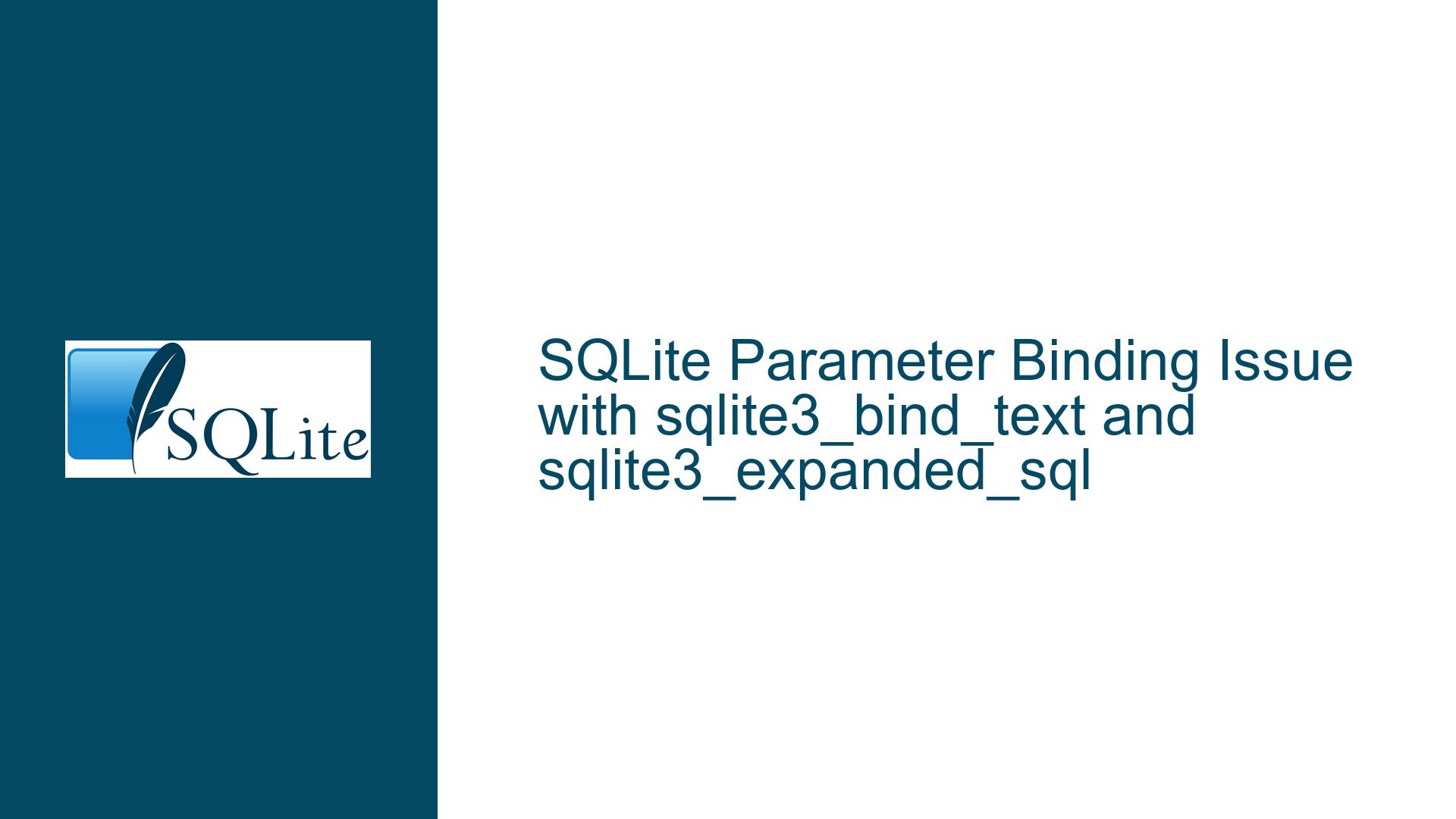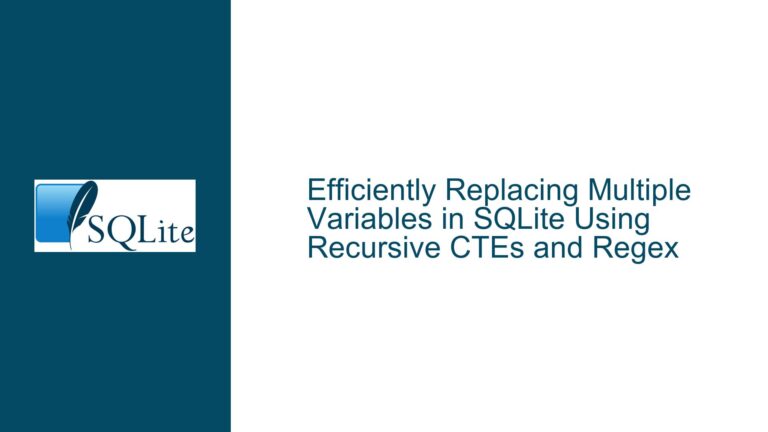SQLite Parameter Binding Issue with sqlite3_bind_text and sqlite3_expanded_sql
SQLite Parameter Binding Mismatch in Prepared Statements
When working with SQLite in C++ using the amalgamation, a common issue arises when binding parameters to a prepared statement and subsequently using sqlite3_expanded_sql to debug or log the final SQL query. The problem manifests when multiple parameters are bound to a prepared statement, but the expanded SQL query incorrectly shows the same value for all parameter placeholders. This issue is particularly perplexing because the individual sqlite3_bind_* calls return SQLITE_OK, indicating no immediate errors during the binding process.
The core of the problem lies in the interaction between the lifetime of the bound values and the behavior of sqlite3_expanded_sql. Specifically, when binding string parameters using sqlite3_bind_text, the way SQLite handles the memory of the bound strings can lead to unexpected results if not managed correctly. This issue is exacerbated when the bound strings are temporary or subject to change during the execution of the program.
Memory Management and SQLITE_STATIC vs. SQLITE_TRANSIENT
The root cause of the parameter binding mismatch is related to how SQLite manages the memory of the bound values. When using sqlite3_bind_text, the function allows you to specify how SQLite should handle the memory of the string being bound. This is controlled by the final parameter of the function, which can be either SQLITE_STATIC or SQLITE_TRANSIENT.
SQLITE_STATIC tells SQLite that the string being bound is static and will not change during the lifetime of the prepared statement. SQLite will not make a copy of the string and will instead use the pointer provided. This is efficient but can lead to issues if the string is modified or goes out of scope before the statement is finalized.
SQLITE_TRANSIENT, on the other hand, instructs SQLite to make a copy of the string immediately. This ensures that the bound value remains consistent even if the original string is modified or destroyed. This is safer but comes with a slight performance overhead due to the additional memory allocation and copying.
In the scenario described, the use of SQLITE_STATIC is causing the issue because the string being bound is temporary and changes between bindings. As a result, when sqlite3_expanded_sql is called, it references the same memory location for all parameters, leading to the incorrect display of the expanded SQL query.
Correcting Parameter Binding with SQLITE_TRANSIENT and Best Practices
To resolve the issue, the binding of string parameters should be done using SQLITE_TRANSIENT instead of SQLITE_STATIC. This ensures that SQLite makes a copy of the string at the time of binding, preserving the correct values for each parameter. Here’s how the corrected binding code should look:
rc = sqlite3_bind_text(stmt, valueCount, value.c_str(), -1, SQLITE_TRANSIENT);
By using SQLITE_TRANSIENT, SQLite will allocate memory for the string and copy the contents, ensuring that the bound value remains consistent even if the original string is modified or goes out of scope. This resolves the issue of the expanded SQL query showing incorrect values for the parameters.
In addition to correcting the binding method, there are several best practices to follow when working with SQLite parameter binding:
Always Use Parameterized Queries: Parameterized queries not only improve security by preventing SQL injection but also make the code more readable and maintainable. They allow SQLite to optimize the query execution plan, leading to better performance.
Choose the Right Binding Type: When binding values, choose the appropriate
sqlite3_bind_*function based on the data type of the parameter. For example, usesqlite3_bind_intfor integers,sqlite3_bind_doublefor floating-point numbers, andsqlite3_bind_textfor strings.Manage Memory Carefully: When binding strings, be mindful of the memory management options (
SQLITE_STATICvs.SQLITE_TRANSIENT). UseSQLITE_TRANSIENTif there is any possibility that the string might change or go out of scope before the statement is finalized.Check Return Codes: Always check the return codes of SQLite functions to catch errors early. Even if a function like
sqlite3_bind_textreturnsSQLITE_OK, it’s good practice to verify that the binding was successful.Use
sqlite3_expanded_sqlfor Debugging: Whilesqlite3_expanded_sqlis a useful tool for debugging, be aware of its limitations. It provides a human-readable representation of the SQL query with bound parameters, but it should not be used in production code due to potential performance overhead.Finalize Prepared Statements: Always finalize prepared statements using
sqlite3_finalizewhen they are no longer needed. This releases any resources associated with the statement and prevents memory leaks.Handle Errors Gracefully: Implement error handling to manage any issues that arise during the execution of SQLite operations. This includes checking for errors after each SQLite function call and providing meaningful error messages to the user.
By following these best practices, you can avoid common pitfalls when working with SQLite parameter binding and ensure that your application interacts with the database efficiently and reliably.
Advanced Considerations and Performance Optimization
While the immediate issue can be resolved by using SQLITE_TRANSIENT, there are additional considerations and optimizations that can be applied to further enhance the performance and reliability of your SQLite-based application.
Understanding SQLite’s Memory Management
SQLite’s memory management is designed to be lightweight and efficient, but it requires careful handling, especially when dealing with bound parameters. When you bind a parameter using sqlite3_bind_text, SQLite needs to store the value until the statement is finalized. The choice between SQLITE_STATIC and SQLITE_TRANSIENT determines how SQLite manages this storage.
SQLITE_STATIC: This option is suitable when the bound value is guaranteed to remain valid and unchanged for the entire duration of the prepared statement. This is often the case when binding string literals or values from static memory.
SQLITE_TRANSIENT: This option is necessary when the bound value is temporary or subject to change. SQLite will make a copy of the value, ensuring that the bound parameter remains consistent.
Performance Implications of SQLITE_TRANSIENT
Using SQLITE_TRANSIENT incurs a performance cost due to the additional memory allocation and copying. However, this cost is generally negligible compared to the potential issues caused by incorrect parameter binding. In most applications, the safety and reliability provided by SQLITE_TRANSIENT outweigh the minor performance overhead.
If performance is a critical concern, you can optimize the use of SQLITE_TRANSIENT by minimizing the number of times a string is bound. For example, if you need to bind the same string multiple times, consider binding it once and reusing the prepared statement.
Using Prepared Statements Efficiently
Prepared statements are a powerful feature of SQLite that can significantly improve performance by reducing the overhead of parsing and compiling SQL queries. However, to fully leverage prepared statements, it’s important to use them correctly.
Reuse Prepared Statements: Whenever possible, reuse prepared statements instead of creating new ones for each query. This reduces the overhead of parsing and compiling the SQL query and allows SQLite to optimize the execution plan.
Reset Prepared Statements: After executing a prepared statement, use
sqlite3_resetto reset it to its initial state. This allows you to bind new parameters and execute the statement again without the need to prepare it from scratch.Avoid Finalizing Prematurely: Only finalize a prepared statement when you are certain that it will no longer be needed. Prematurely finalizing a statement can lead to unnecessary overhead if the statement needs to be prepared again.
Debugging and Logging with sqlite3_expanded_sql
sqlite3_expanded_sql is a useful tool for debugging and logging, but it should be used judiciously. The function generates a human-readable representation of the SQL query with bound parameters, which can be invaluable for diagnosing issues. However, it should not be used in production code due to the potential performance overhead.
When using sqlite3_expanded_sql, be aware that the returned string is dynamically allocated and must be freed using sqlite3_free. Failure to do so can result in memory leaks.
Handling Large Data Sets
When working with large data sets, it’s important to consider the memory usage and performance implications of parameter binding. Binding large strings or binary data can consume significant memory, especially if SQLITE_TRANSIENT is used.
To handle large data sets efficiently, consider the following strategies:
Chunking: If you need to bind a large amount of data, consider breaking it into smaller chunks and binding each chunk separately. This reduces the memory overhead and allows SQLite to process the data more efficiently.
Streaming: For very large data sets, consider using streaming techniques to process the data in smaller, manageable pieces. This can be particularly useful when dealing with binary data or large text files.
Database Design: Optimize your database design to minimize the need for large data transfers. For example, consider storing large data in external files and referencing them in the database, rather than storing the data directly in the database.
Transaction Management
Proper transaction management is crucial for maintaining the integrity and performance of your SQLite database. When executing multiple SQL statements, wrapping them in a transaction can significantly improve performance by reducing the number of disk writes.
Begin Transactions Explicitly: Use
sqlite3_execorsqlite3_prepare_v2to begin a transaction explicitly. This ensures that all subsequent statements are executed within the context of the transaction.Commit or Rollback Transactions: Always commit or rollback transactions explicitly to ensure that changes are applied or reverted as intended. Failure to do so can lead to inconsistent data and potential data loss.
Use Savepoints: For complex operations, consider using savepoints to create nested transactions. This allows you to rollback to a specific point within the transaction, providing greater control over the transaction flow.
Error Handling and Recovery
Robust error handling is essential for building reliable SQLite-based applications. SQLite provides several mechanisms for detecting and handling errors, including return codes, error messages, and transaction rollback.
Check Return Codes: Always check the return codes of SQLite functions to detect errors early. This includes functions like
sqlite3_prepare_v2,sqlite3_bind_*,sqlite3_step, andsqlite3_finalize.Retrieve Error Messages: Use
sqlite3_errmsgto retrieve detailed error messages when an error occurs. This can provide valuable insights into the cause of the error and help you diagnose and fix issues more effectively.Implement Recovery Mechanisms: Implement recovery mechanisms to handle errors gracefully. This may include retrying failed operations, rolling back transactions, or notifying the user of the error.
Conclusion
The issue of parameter binding mismatch in SQLite, particularly when using sqlite3_bind_text and sqlite3_expanded_sql, is a common challenge that can be resolved by understanding and correctly applying SQLite’s memory management options. By using SQLITE_TRANSIENT instead of SQLITE_STATIC, you can ensure that bound parameters remain consistent and avoid the pitfalls of incorrect parameter binding.
In addition to resolving the immediate issue, adopting best practices for parameter binding, prepared statement management, and error handling can significantly enhance the performance and reliability of your SQLite-based applications. By following these guidelines, you can build robust, efficient, and maintainable database applications that leverage the full power of SQLite.






